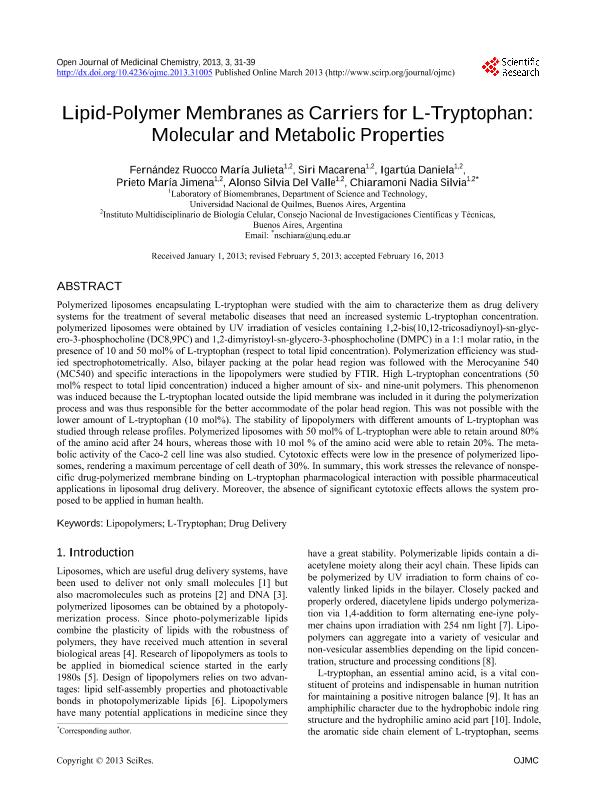Artículo
Lipid-polymer membranes as carriers for L-tryptophan: molecular and metabolic properties
Fernandez Ruocco, Maria Julieta; Siri, Macarena ; Igartúa, Daniela
; Igartúa, Daniela ; Prieto, Maria Jimena
; Prieto, Maria Jimena ; Alonso, Silvia del Valle
; Alonso, Silvia del Valle ; Chiaramoni, Nadia Silvia
; Chiaramoni, Nadia Silvia
 ; Igartúa, Daniela
; Igartúa, Daniela ; Prieto, Maria Jimena
; Prieto, Maria Jimena ; Alonso, Silvia del Valle
; Alonso, Silvia del Valle ; Chiaramoni, Nadia Silvia
; Chiaramoni, Nadia Silvia
Fecha de publicación:
03/2013
Editorial:
Scientific Research
Revista:
Open Journal of Medicinal Chemistry
ISSN:
2164-3121
Idioma:
Inglés
Tipo de recurso:
Artículo publicado
Clasificación temática:
Resumen
Polymerized liposomes encapsulating L-tryptophan were studied with the aim to characterize them as drug delivery systems for the treatment of several metabolic diseases that need an increased systemic L-tryptophan concentration. polymerized liposomes were obtained by UV irradiation of vesicles containing 1,2-bis(10,12-tricosadiynoyl)-sn-glyc- ero-3-phosphocholine (DC8,9PC) and 1,2-dimyristoyl-sn-glycero-3-phosphocholine (DMPC) in a 1:1 molar ratio, in the presence of 10 and 50 mol% of L-tryptophan (respect to total lipid concentration). Polymerization efficiency was stud- ied spectrophotometrically. Also, bilayer packing at the polar head region was followed with the Merocyanine 540 (MC540) and specific interactions in the lipopolymers were studied by FTIR. High L-tryptophan concentrations (50 mol% respect to total lipid concentration) induced a higher amount of six- and nine-unit polymers. This phenomenon was induced because the L-tryptophan located outside the lipid membrane was included in it during the polymerization process and was thus responsible for the better accommodate of the polar head region. This was not possible with the lower amount of L-tryptophan (10 mol%). The stability of lipopolymers with different amounts of L-tryptophan was studied through release profiles. Polymerized liposomes with 50 mol% of L-tryptophan were able to retain around 80% of the amino acid after 24 hours, whereas those with 10 mol % of the amino acid were able to retain 20%. The meta- bolic activity of the Caco-2 cell line was also studied. Cytotoxic effects were low in the presence of polymerized lipo- somes, rendering a maximum percentage of cell death of 30%. In summary, this work stresses the relevance of nonspe- cific drug-polymerized membrane binding on L-tryptophan pharmacological interaction with possible pharmaceutical applications in liposomal drug delivery. Moreover, the absence of significant cytotoxic effects allows the system pro- posed to be applied in human health.
Palabras clave:
Lipopolymers
,
L-Tryptophan
,
Drug Delivery
Archivos asociados
Licencia
Identificadores
Colecciones
Articulos(CCT - LA PLATA)
Articulos de CTRO.CIENTIFICO TECNOL.CONICET - LA PLATA
Articulos de CTRO.CIENTIFICO TECNOL.CONICET - LA PLATA
Articulos(IMBICE)
Articulos de INST.MULTIDISCIPL.DE BIOLOGIA CELULAR (I)
Articulos de INST.MULTIDISCIPL.DE BIOLOGIA CELULAR (I)
Citación
Fernandez Ruocco, Maria Julieta; Siri, Macarena; Igartúa, Daniela; Prieto, Maria Jimena; Alonso, Silvia del Valle; et al.; Lipid-polymer membranes as carriers for L-tryptophan: molecular and metabolic properties; Scientific Research; Open Journal of Medicinal Chemistry; 3; 1; 3-2013; 31-33
Compartir
Altmétricas



